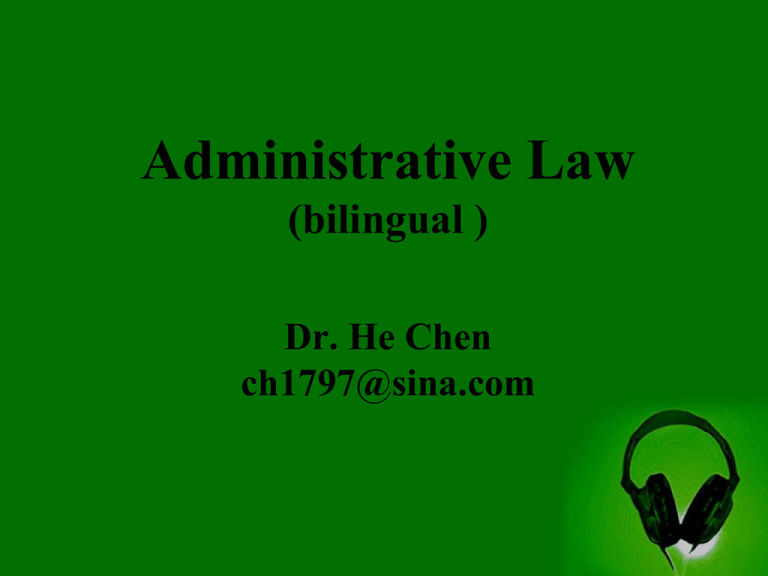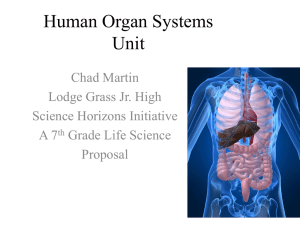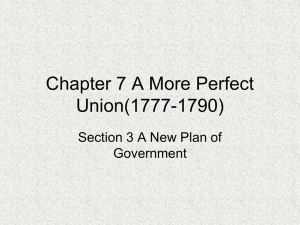administrative law_1
advertisement

Administrative Law (bilingual ) Dr. He Chen ch1797@sina.com Chapter 1: Introduction •Basic Terms •Basic Principles of Administrative Law •Sources of Administrative Law •Development of Administrative Law 1.1 Basic Terms •1.1.1 Administration •Instead of general administration, the administration in administrative law refers to public administration, that is, the organizing and management of public affairs by state organ. •Administration is the organizing agency of the state.——Carle Marx •The goal of public administration is to realize public interests, to maintain public order and to enhance public welfare. •Therefore, the state administrative organization enjoys certain privileges and can adopt the measures that are exclusive to common organizing and managing practice. •For example: •Order an enterprise to perform certain duty •Give punishment to those who violates the order •Administration & Constitutionalism •Constitutionalism has 3 main points: – The division of functions in state organs (checks & balances) – Protection of civil rights – Limitation of government’s power •The state organs which is organized by popularly elected representatives is the supreme organ of state power (legislation organ). •The will of the public is embodied through the laying down of the law and the government is under the law. (rule of law) •The public administration after the division of function has the feature of subordination (all administrative practice is subject to the law). •“ That we here highly resolve that these dead shall not have died in vain; that this nation shall have a new birth of freedom; and that this government of the people, by the people, for the people, shall not perish from the earth.” •——Gettysburg Address, Abraham Lincoln, 1863 •Democracy Show民主“秀” •Victory speech of Obama,2008 •http://you.video.sina.com.cn/b/175002931343881957.html •1.1.2 Executive Power •The rights possessed by state administrative organs to execute legal norm and administrative practice. •In modern society, executive power has quite broad content, including administrative legislation, administrative enforcement of law, administrative judicature, etc.. •Compared with other state power, executive power has the characteristics of initiative( 主 动 性 ), universality( 广 泛 性 ) and discretion(自由裁量性). •Compared with the rights of individuals and other organizations , it is compulsory( 强制的 ), unilateral( 单 方 的 ) and privileged(特权的). •The duality of executive power: – On the one hand, it plays a positive role in the maintenance of social order; – On the other hand, it would play a negative or even destructive role without certain restrictions based on principles and procedures. •Case study: Violent law-enforcement 郑州城管暴力执法视频 •The power free of restriction and control certainly will lead to corruption. •Executive power & Civil rights •Civil rights refers to citizens’ autonomy, interests, freedom and capacity. •It includes political rights and freedom, religious freedom, personal freedom, social and economical rights, the right of education, the right of accusation, and the right of suit, etc.. •Executive power, origins from civil rights, is a kind of special transformation mode of civil rights. • Citizens’ own organ of power is created by their election and then divides executive power from uniform state power, then government is formed to execute this power. •1.1.3 Administrative Relation •Social relation which occurs in the course of the execution of executive power by administrative organ. •Includes: – The administrative management relation between administrative organs and citizens, legal persons or other organizations. – The functions and powers relation between administrative organs and the administrative post relation between administrative organs and their staff members. – The supervisory administrative relation between administrative organs and other state organs, social organization and individuals. •1.1.4 Administrative Law •Is sum total legal norms on the adjustment of administrative relation. •How to understand it? •The goal of administrative law is to realize administration by law in order to validate the administrative legal order that with the people’s interests and will. •Administrative law is the law to regulate administrative organization and executive power, and it is also the law to remedy the aftermath of the exercise of executive power. •1.1.5 Classification of Administrative Law •Firstly, norms on administrative organizations; •Secondly, norms of conduct, which are the broadest, the most numerous, and the most complicated; •Thirdly, norms on the supervision to administration. •1.1.6 Features of Administrative Law •1.1.6.1 Formal(形式) features – A) There is no uniform and integrated code for administrative law. • Broad field of society; complex content; high technicality; difficult to make an all-inclusive and uniform administrative code. – B) The number of the legal forms, legal form and legal document that are essential for the existence of administrative legal norms are all specially large. • Administrative law belongs to multilevel legislation, so both authorized state power organs and authorized administrative organs can make the law. • It is different from civil law, criminal law and etc., which are usually made by supreme state power organ. •1.1.6.2 Features in content •A) administrative law possesses quite broad content. – It is not only confined to traditional public security, military, tax affairs, diplomacy, but also includes business, food, sanitation, health care, environment, labor service and social welfare, etc.. •B) administrative legal norms that appear as administrative rules and regulations are mutable and less stable. – Administrative activities are adapted to social development. •C) the substantive norms and procedural norms are usually interlaced with each other and coexist within one legal document. – In administrative relations, for the requirement of equity, science and efficiency, it is necessary for the state to prescribe certain procedures for administrative organs in the enforcement of authority. 1.2 Basic Principles of Administrative Law •The basic principles of administrative law are the fundamental rules that direct and regulate the legislation and implementation of administrative law, the enforcement of administrative act and the treatment of administrative disputes. •They are the guideline that reflect the basic values of administrative law and run through the concrete regulations of administrative law but higher than the concrete regulations. •1.2.1 Responsibility of administration principle •It is the basic requirement to realize the administration ruled by law and is the foundation of administrative law. •1.2.1.1 the meanings •Responsible administration means that state administrative organs shall be responsible for their administrative activities. •If administrative activities can arbitrarily make influence and need not to undertake responsibilities, the interests of citizens and social organizations will be greatly threatened and the whole society will be endangered. •1.2.1.2 the content •There shall be responsibility where there are administrative activities. •Requires definite subject. •Requires the establishment of the legal system of responsibility, such as administrative litigation system, reconsideration system, and compensation system. •1.2.2 Lawfulness of administration principle •1.2.2.1 the meanings •It means that administrative organs shall abide the law. •The law regulates the authority limit, methods and measures of administrative organs’ activities. •What does the term “law” mean? •It can be understood either in broad or in a narrow sense. •Now it not only refers to the law made by organs of state power (congress), but also includes the law made pursuant to authorization under the presupposition that these administrative regulations do not at variance with the law. •1.2.2.2 the content •Administrative activities can only be conducted in a legal scope •Administrative acts must be in accordance with the law, including certain fact, legal authority, and legal procedures. •Case study: entrapment in Shanghai •——“Entrapment claimed in seizure of 'black cab'”,17th Oct, 2009, Shanghai Daily •A Shanghai company said yesterday that one of its drivers was entrapped by traffic authorities investigating illegal cabs. •Similar allegations have been raised by other drivers who claim the traffic watchdog, which is in the midst of a two-year crackdown(严打) that has generated millions of yuan in fines, used bounty hunters (赏金猎人)to manufacture false evidence. •In the latest incident, the driver was so disturbed about the allegation that he cut off part of a finger in a misguided attempt to prove his innocence(无辜). •The company said Sun was innocent and claimed the 19-yearold was set up by the traffic team on a charge of operating an unlicensed cab after he picked up a pedestrian who asked for a lift. 西方的“钓鱼执法” (http://you.video.sina.com.cn/b/29914469-1413384995.html) •1.2.3 Reasonableness of administration principle •1.2.3.1 the meanings •It means that the content of administrative acts shall accord with legal rationales such as being objective, within certain limits, and being fair and just. •Any law ,especially the laws that specify administrative activities, has its limits. •The law is impossible to specify all administrative activities, and the regulation of the law on administrative activities are impossible to be exhaustive and reach every aspect, so administrative organs need to enjoy certain discretion. •1.2.3.2 the content •Administrative acts must be in accordance with legal goals •The motive of administrative acts shall be reasonable •Administrative acts shall take related factors into consideration •Administrative acts shall be just •What is justice? •A common requirement of the society. Dose it has objective criteria? – – – – Equal cases shall be treated equally Principle of proportionality The convention shall be abided by Administrative organ’s acts shall be consistent •Case study:死婴悲剧,本不该发生 •新华网《新华纵横》2000年9月13日特稿 •2000年8月22日,辽宁省法库县迎宾路口, 一值勤民警因阻拦临产孕妇的三轮车通行,致 使胎儿当街出生,随即死亡。 •王刚(法库县交警大队):"是有一名陌生男子,他说是 蹬板车的,还说车上有位病人,要由此往镇医院去,走这 条禁行路。我当时回答这条路是县里三整顿规定的迎宾路, 是禁行的,除非有特殊情况才可以通行,其它情况一律绕 行。" •本来300米左右,步行只需4分钟的路程,却辗转用了 40多分种,三轮车这才载着呻吟不停的叶艳红到了镇医 院门口。产妇叶艳红一下车就高喊:“老妹,我不行了,我 生了。”话音未落,孩子便从裤腿里掉了出来。可怜这个刚 刚来到人世的男婴,只哭了一声就夭折了。产妇叶艳红随 即大出血,幸亏医护人员及时抢救才脱离危险。 •群众:"法库县是农业县,不可能不让马车走,生小孩不 让人过来,就连飞机孩子有病都能临时降落,咱们生个孩 子就不让车走能说得通吗?" 1.3 Sources of Administrative Law •Sources of law refers to the form in which way the law exists. It is the origin or the source from which the legal norms of different departments come from, that is, the carrier of laws. •Generally speaking, the sources of administrative law in China include the constitution, laws, administrative regulations, departmental rules, local regulations, regulations on the exercise of autonomy and other separate regulations of autonomous regions, and rules of local governments, etc.. •1.3.1 Basic sources of administrative law •1.3.1.1 Constitution •As the fundamental law of a country, constitution is not only a source of administrative law,but also sources of other legal department. •The administrative law constitution are as follows: norms in – Norms on basic civil rights and obligations, such as the right to criticize, and make suggestion, the right to make complaints or charge against. Citizens of the PRC enjoy freedom of speech, of the press, of assembly, of association, of procession and of demonstration. No citizen may be arrested except with legal procedures. The right to work, receive education and social security and the norms on duty to pay taxes, to observe by the law and public order and to respect social ethics. – Norms on the organizing, basic working system and authority of government administrative organs, such as norms on the basic function and power of ministries, commissions and auditing organ under the state council, the norms on the organizing, basic working system and basic authority of local governments at different level, etc.. – Norms on basic principles of administrative activities, such as the principle of people’s participation in management, the principle of unification of legal institution, the principle of job responsibility system, the principle of equality of nationality, and the principle of people’s supervision over functionary of administrative organs and the security of citizens’ rights. – Norms on the rights and obligations of state owned economic organizations, collective economic organizations, and foreign-funded or jointly-funded enterprises in administrative acts, and norms on state protection of the lawful interest of private economy. Homework: •Read “CONSTITUTION OF THE PEOPLE'S REPUBLIC OF CHINA” and write an article with the title “ The Constitution in My Eyes” in English. •Watch the film •Mr. Smith Goes to Washington •1939年,当这部电影刚上映时,因其中对财团和政客间互 相勾结谋取利益的揭露,而遭到华府官员的强烈反对。卡普 拉在他的自传中提到,一天他和哈里·考恩(Harry Cohn) 收 到 时 任 美 国 驻 英 大 使 约 瑟 夫 · 肯 尼 迪 ( Joseph P. Kennedy)发来的一封电报,要求中止这部电影在欧洲的发 行,理由是:“这将会影响美国在欧洲的声誉。”卡普拉和 考恩把对这部电影的一些正面评论邮寄给肯尼迪作为回答, 肯尼迪最终没有再就此事进行追究。然而因为片中涉及对民 主政治的描写,这部电影在法西斯国家中还是遭到了禁演, 但这些曲折都没有阻止这部电影最终成为好莱坞黄金时代经 典之作。虽然是主旋律作品,却并不一定要成为政府的喉舌, 诚然这部电影中,依然可以窥见卡普拉对美国式民主的自信 和自豪,假如没有制度的保护,史密斯断不可能再度站在议 事厅里慷慨陈词,但是真正的自由、平等与民主,是高于国 家和政府的,是属于全人类共有的精神财产。只有当一个导 演把关注的焦点落在全人类共有的情感和追求时,他的作品 才可能突破时空的局限流传下去,成为真正的经典。 •1.3.1.2 Law •The law is the normative legal documents made by the supreme organ of state power, including the basic laws made by the national people’s congress (NPC) and the non-basic laws made by the standing committee of the national people’s congress. – Among the laws, the part that concerns the organizing of administrative organs, administrative activities and the content of administrative remedy may be regarded as the source of administrative law. – Some laws, as the source of administrative law, have the nature of administrative law on the whole. For example, The Organic Law of the State Council of PRC, The Administrative Penalty Law. – Some laws partly have the nature of administrative law, such as The Environmental Law of PRC. •1.3.1.3 The normative legal documents made by administrative organs •They are next to the constitution and the law, and cover the following documents: – Administrative regulations, the normative legal documents made by the State Council according to the authorization of the constitution. – Administrative rules or departmental rules, which are the rules released by the ministries and commissions of the State Council or by some job departments. – Local rules or the rules of local governments. That is, the rules made by the governments of provinces, autonomous regions and municipalities directly under the General Government, by governments of the capital cities of provinces, autonomous regions, by governments of bigger cities approved by the State Council or by the government of special economic zones. •However, the normative legal documents made by administrative organ shall not be against the constitution and the laws. •Also, the normative legal documents of one level shall not be at variance with that of the higher level. •1.3.1.4 Local regulations, regulations on the exercise of autonomy(自治条例) and separate regulations(单行条例) •1.3.2 Other sources of administrative law •1.3.2.1 International treaties and agreements •1.3.2.2 Interpretation of law – The interpretation made by authorized organs, including legislative interpretation, judicial interpretation, administrative interpretation and local interpretation. The judicial interpretation of the Supreme People’s Court is of special important status. •1.3.2.3 The normative legal documents jointly released by state administrative organs, the ruling party and social organizations •For example, documents jointly released by the State Council and the central committee of the Communist Party of China. 1.4 The Development of Administrative Law •1.4.1 Theoretical basis for administrative law •Rousseau卢梭(1844-1910) put forward the claim of “natural rights”. This ideology was affirmed after the French Revolution of the bourgeoisie. The appearance of administrative law is to guard the natural rights of citizens. •A more direct influence on the generation of administrative law is the theory of the separation of three powers, which was founded by Montesquieu 孟德斯鸠1689-1755 . •“Constant experience shows us that every invested with power is apt to abuse it. To prevent this abuse, it is necessary from the very nature of things that power shall be a check to power.” •——by Montesquieu •Montesquieu believed that in all countries there are legislative power, judicial power and executive power. He suggested that the three powers separately exercised by different organs in order to ensure the existence of liberty. The separation of powers emphasizes the balance of powers, which certainly led to the regulating and control on executive power. •The theory of rule of law also deeply influences the generation and development of administrative law. •rule of law (法治) •It is a concept relative to “rule of man”. It’s hallmark is the presence of a government under the law. •human nature, the sum of qualities and traits shared by all human beings. •1 . 4 . 2 The historical development of administrative law in new China •Administrative law in new China was generated in 1950’s, but is was paid little attentions to and was not systematical until 1980s. •Administrative Litigation Law,1989 •Law of the People’s Republic of China on State Compensation,1994 •Administrative Penalties Law,1996 •Administrative Reconsideration Law,1999 •Administrative Supervision Law,1997 •Law of Legislation,2000 •Administrative License Law,2004 •Civil Servant Law,2005 •Regulations on Letters and Visits,2005 • Administrative Coercion Law,2011 •Still under way: •Administrative Procedure Law •法治国家在中国的提出: •1978年恢复社会主义法制建设,“有法可依, 有法必依,执法必严,违法必纠”。 •1997年,党的十五大,“实行依法治国,建 设社会主义法治国家。” •1999年宪法修正案,“中华人民共和国实行 依法治国,建设社会主义法治国家。” •2002年,党的十六大,“全面落实依法治国 的基本方略。” •2007年,党的十七大,“加快建设社会主义 法治国家。” •The development of administrative law rooted from the reform and opening to the outside world, rooted from deep renovation of national economy and social system. The reform of economic system means the change of the relationship between the country and citizens, the transition of citizens’ status from object to subject and the necessity to redefine and control government’s power. •法 制 ( rule by law ) 与 法 治 ( rule of law) •“刀治”与“水治”,强制与平等,两 个拳头的关系 •身份证图案设计所体现出来的法制观 •法的主要功能是分配权利义务,而不是 惩治。 •中国传统政治是人治=德治+法制 •外儒内法,不是法治 •唐太宗的故事:公元628年,李世民出 宫女三千余,令之“任求伉俪”。633年 纵狱囚应死者390人归家,命令他们秋后 自来就死,至期皆至,如是全部赦免。 白居易有诗,歌颂太宗德政:“怨女三 千出后宫,死囚四百来归狱。”











